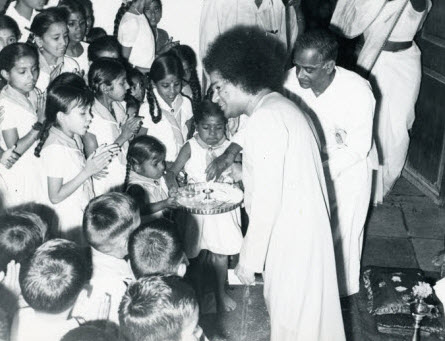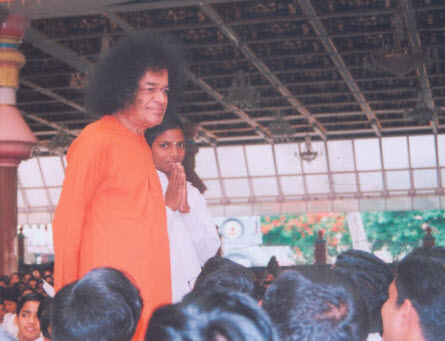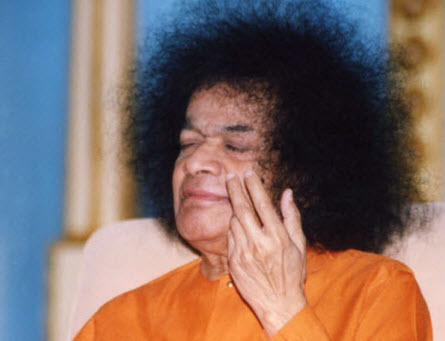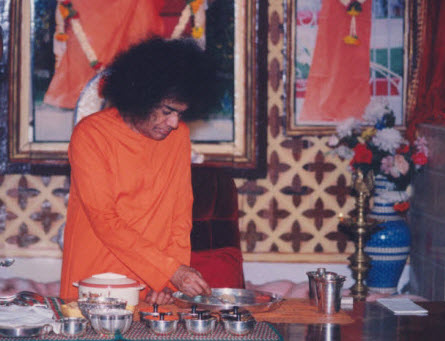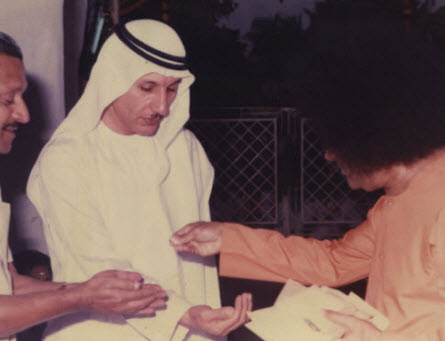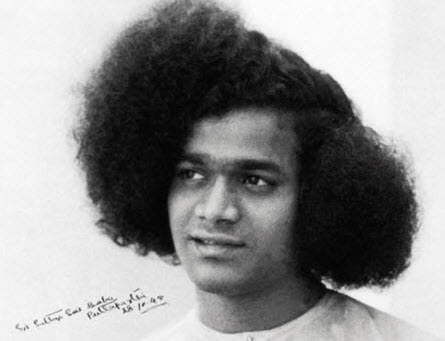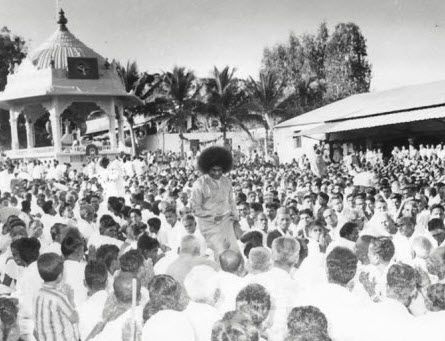PRAYERS & CHANTS
Where my devotees sing, there I install Myself. [1960.9.27] Sathya Sai Baba
Group devotional singing has a different purpose from silent individual prayers. It is a mutual effort of spiritual practice to overcome the six foes of man: lust, anger, greed, attachment, conceit, and hatred. [1975.4.1] Sathya Sai Baba
Singing the name by a group of people can help the process of liberation not only for the members of the group. It will benefit those who listen and even those beyond the circle of listeners —the whole world can benefit from the vibrations. [1982.1.26] Sathya Sai Baba
-
-
Omkaram +
In Prasanthi Nilayam at early dawn, the people in the Mandir chant 21 Oms and Shanti, Shanti, Shanti. Each part of this chanting is significant, and knowing the significance can make this spiritual discipline more meaningful to us. Om is the verbal symbol of God, says Swami; it announces the Lord's presence. It is the primeval sound. In fact, Swami has said that Om is the only sound --every other sound arises from it. Swami has called Om the real life-principle of every person. So, when chanting Om, we are calling God and also affirming that we are God.
The number 21 is not arbitrary, and each of the 21 Oms is chanted for a purpose. - Five Oms are chanted for the organs of action: vocal chords, hands, feet, elimination organs (represented by the anus), and generative organs. - Five Oms are for the organs of perception: eye, ear, nose, tongue, and skin, which correspond to sight, hearing, smell, taste, and touch. - Five Oms are for the five vital airs of the body. English doesn't seem to have names for these vital airs, so we list them with their Sanskrit names. They are: prana (located in lungs), apana (flatus, which moves downward through the rectum), vyana (diffused throughout the whole body), samana (navel; essential to digestion), and udana (rises through throat to head). - Five Oms are for the five sheaths or encasings of the body: the material sheath, the sheath of vital air, the mental-emotional sheath, the sheath of intellect, and the sheath of bliss. - The last Om is for the person itself --and the person's self-realisation. Chanting twenty Oms purifies and clarifies the five organs of action, the five organs of perception, the five vital airs, and the five sheaths. This prepares the human being for merger with the Supreme. Swami advises us to think of the life-principle in a person as a rider on a twenty-headed horse; we chant Om for each of the 21 components.
Omkar ends with three Shantis: peace is chanted for purity of the body, purity of the mind, and purity of the spirit. In other words, Peace is prayed for in the physical, mental, and spiritual planes. Swami has said that "This recital of Om will tone you up, calm all agitations of the mind, and quicken the downpour of grace." He has said that "spiritual discipline of this sort is a must for all Sai workers, for it alone can give them peace and the other most valuable gift, love." We hope this explanation will make Omkar more precious to you This page was written using Swami's own words in Sathya Sai Speaks 14, Chapter 3, discourse on 6 June 1978.
-
Meditation +
"There are two roads to fulfillment: prayer and meditation. Prayer makes you a supplicant at the feet of God. Meditation (dhyana) induces God to come down to you and inspires you to raise yourselves to Him; it tends to make you come together, not place one in a lower level and the other on a higher." Sathya Sai Speaks V, 'Lamps Lit from the Same Flame'
Bhagawan Sri Sathya Sai Baba's Guidance on Meditation 
Jyothi(Light) Meditation by Dr Jumsai 
Jyothi(Light) Meditation by Dr Jum Sai- Alternate Version 
-
Suprabhatham +
This song is sung in the early morning, at dawn, say, to Swami. We present the Sanskrit version as well as an English translation. The English translation is not quite a literal translation, producing instead a beautiful singable version with roughly the same meaning.
Suprabhatham - Sanskrit Version 
Suprabhatham - English Version 
-
Gayatri Mantra +
Om Bhur Buvaha Suvaha; Thath Savithur Varenyam; Bhargo Devasya Dheemahi; Dhiyo Yonaha Prachodayath
Om Shanthi Shanthi Shanthih
-
108 Names and 1008 Names With Meanings in English +
Download 
Meal Time Prayer +
Swami's explanation of this prayer
We should partake food with a sathwic (pure, serene) mind. Our ancestors recommended the offering of food to God before partaking. Food so partaken becomes prasad (consecrated offering). Prayer cleanses the food of the three impurities caused by the absence of cleanliness of the vessel, cleanliness of the food stuff, and cleanliness in the process of cooking. It is necessary to get rid of these three impurities to purify the food, for pure food goes into the making of a pure mind. It is not possible to ensure the purity of the cooking process because we do not know what thoughts rage in the mind of the man who prepares the food. Similarly, we cannot ensure the cleanliness of the food ingredients because we do not know whether it was acquired in a righteous way by the person who sold it to us. Hence, it is essential on our part to offer food to God in the form of prayer so that these three impurities do not afflict our mind.
Audio file of Meal Time Prayer Meaning & Significance of Meal Time Prayer 
Vibhuthi Prayer +
Morning and Evening Prayers +
The morning and evening prayers were given by Sathya Sai Baba in his discourse on 27 July 1961. He said,
"Adopt these as your daily prayers. The best thing is to have your own Self as the source of Light, as the guru. The Inner Intelligence, the Inner Guru will reveal the Truth. This prayerful attitude will so educate your impulses that the Inner Intelligence will be fully revealed"
Morning prayer
Know that waking from sleep is but birth and going into sleep is death. On waking, pray every morning of your life,
“Oh Lord, I am born now from the womb of sleep. I am determined to carry out all tasks this day as offerings to Thee, with Thee ever present before my mind’s eye. Make my words, thoughts, and deeds sacred and pure. Let me not inflict pain on anyone; let no one inflict pain on me. Direct me, guide me, this day.”
Evening prayer
And when you enter the portals of sleep at night, pray,
“Oh Lord! the tasks of this day, whose burden I placed on you this morning, are over. It was You who made me walk and talk and think and act. I therefore place at Thy Feet all my words, thoughts, and deeds. My task is done. Receive me, I am coming back to you.”
Prayer of Surrender +
This prayer is written on the wall near the entrance to the Western Canteen in Prasanthi Nilayam. It is not a prayer but, instead, instructions on how to surrender.
It is attributed to Sathya Sai Baba, but the source is unknown —it has not been found in a discourse or the Vahinis.
Why get agitated? Let Me take care of all your business. I shall be the one who will think about them. I am waiting for nothing else than your surrender to Me, and then you do not have to worry any more about anything. Say farewell to all fears and discouragement.
You demonstrate that you do not trust Me. On the contrary, you must rely blindly on Me.
To surrender means: To turn your thoughts away from troubles, to turn them away from difficulties that you encounter and from all your problems. Leave everything in My hands saying, "Lord, Thy will be done. Thou think of it." That is to say, "Lord, I thank you, for you have taken everything into your hands, and you will resolve this for my highest good."
Remember that thinking of the consequences of a thing is contrary to surrender. That is to say, when you worry that a situation has not had the desired outcome, you demonstrate that you do not believe in My love for you —you prove that you do not consider your life to be under My control and that nothing escapes Me.
Never think: How is this to end?... What is going to happen? If you give into this temptation, you demonstrate that you do not trust Me. Do you want Me to deal with it — yes or no? Then you must stop being anxious about it! I shall guide you only if you completely surrender to Me. And when I must lead you on a different path than the one that you expect, I carry you in My arms.
What seriously upsets you is your reasoning, your worrying, your obsession, and your will to provide for yourself at any price. I can do so many things when the being, in his material necessities as in his spiritual ones, turns to Me saying, "You think of it," and then closes his eyes and rests quietly.
You will receive a lot, but only when your prayer relies fully upon Me. You pray to Me when in pain so that I intervene, but in the way you desire it. You do not rely on Me, but you want Me to adjust to your requests.
Don't behave like sick ones who ask for a treatment from the doctor, all the time suggesting it to him. Do not do that, but rather, even in sad circumstances, say, "Lord I praise and thank You for this problem, for this necessity. I pray You to arrange things as You please for this terrestrial, temporal life. You know very well what is best for me."
Sometimes, you feel that disasters increase instead of diminish. Do not get agitated. Close your eyes and tell me with faith, "Thy will be done. You think of it." And when you speak thus, I accomplish a miracle when necessary. I think of it only when you trust me totally. I always think of you, but I can help you completely only when you rely fully on Me
Samastha Lokah Sukhino Bhavanthu +
which means “Let all the worlds be happy,” (and thereby all the beings in the worlds). The earlier mantra referred only to this world. The new mantra refers to all the worlds and is broader in outlook. Please note that no group or Sai Center has to chant this mantra. Whether it is chanted depends on the culture of each Sai Center. But, if you do chant it, chant it as Swami has said.
Samastha Lokah Chanting in Prasanthi Nilayam Western Style Sheet Music with Chords for Samastha Lokah Sukhino Bhavanthu 
Saithree +
The Three Sai Manthras
Swami On 24 December 1977, in Thrayee Brindaavan, the Sai (Eeshvara) Gaayathree was revealed by Swami to Ghandikota Subrahmanya Shaastri, doyen of Vedhik learning, culture, and practice. Years later, on 22 September 1997 the Sai Suurya Gaayathree was revealed to Ghandikota V. Subba Rao, Ghandikota Subrahmanya Shaastri's son, when Sathya Sai Baba was riding the Golden Chariot. (Click on either picture to see a larger version of it.). On 15 February 1999 the Sai Hiranyagarbha Gaayathree was revealed to Ghandikota V. Subba Rao, during Mahaashivaraathree. The last line of the Sai Hiranyagarbha Gaayathree was actually first said by Sathya Sai Baba, as Subba Rao was struggling to complete the Gaayathree. Ghandikota V. Subba Rao has written a little booklet titled "Saithree: Manthra, Yanthra, Thanthra", which discusses these Gaayathrees. The booklet is available in the Prashaanthi Books & Publications Trust in Prashaanthi Nilayam. The booklet explains these manthras and their use in detail. For example, the booklet tells us that:
Sai Eeshwaraaya Gaayathree
serves as a bridge to the divine cosmic life Principle of Eeshvara. It is related to the deepest Super consciousness in us all. The best time to chant this Gaayathree is 4AM to 10AM.
Om Saayeeshvaraaya vidhmahe Sathya-dhevaaya dheemahi Thannah-Sarvah prachodayaath
Sai Eeshvaraaya Gaayathree We know this Sai as supreme divinity incarnate. We meditate on this God of Truth. May this Almighty All-in-all Personality lead us on the path of total liberation.
Sai Surya Gaayathree
relates to the body level in cosmic form --Suurya is the Sun God. It is related to consciousness in the outer world. The best time to chant this Gaayathree is 10AM to 4PM.
Om Shree Bhaaskaraaya vidhmahe Saayi-dheyvaaya dheemahi Thannah-Suurya prachodayaath
Sai Suurya Gaayathree We know this Self-shining Entity. We meditate on this divinity as Sai Suurya. May this divine Light enlighten us on the path of liberation
Sai Hiranyagarbha Gaayathree
enables us to link with the divine cosmic Mind, Hiranyagarbha (Golden-wombed Divinity). It is related to the subconscious-psychosomatic conscience. The best time to chant this Gaayathree is 4PM to 10PM.
OmPremaathmanaaya vidhmahe Hiranyagarbhaaya dheemahi Thannah-Sathyah prachodayaath
We know this embodiment of divine Love, Sathya Sai. We meditate on this Golden-wombed divine personality. May the Truth Incarnate, Shree Sathya Sai, inspire us on the path of liberation.
Sai Hiranyagarbha Gaayathree Aarathi, Asathoma and Sarva Dharma Prayers +
The prayer-song Arathi is often (but does not have to be) sung at the close of a devotional singing (bhajan) session.The word refers both to the song-prayer and the waving of a camphor flame to a Deity. Arathi is sung and performed to develop highest love for God and to express devotion. In Hindu temples, one may find Arathi being sung and performed to various aspects of God, such as Ganesha, Durga, and even the Ganges river. Correspondingly, there are different versions of the Arathi song.
Arathi is sung and performed at the end of each darshan in Prasanthi Nilayam, while a camphor flame is waved in a slow circle, facing Bhagavan. It has been said that the camphor flame has itself has been endowed by Bhagavan with the value and validity of a grand prayer, the culmination of the hour-long yearning (during the bhajan session) of all devoted hearts. Bhagavan says, "While it is being waved pray : O Lord! Make the allotted span of my life as pure, as fragrant, and as transparent as camphor; let it consume itself in the fire, scattering light and the warmth of love to all around me, and, at the end of it all, let there be nothing left of me (as the camphor leaves no ashes or residue) to render me liable to another sojourn amidst pleasure and pain."
As with all rituals, it is not necessary to sing Arathi and wave the flame. Sai Center meetings should reflect the culture of the people in the local community as well as its members, and Center meetings should be such that they are welcoming to members of all religions.
Vedam Chanting Tutorials +
Vedas are the very words of God. They have no beginning and will have no end. They are not books written by authors. They are revelations conferred by God on many inquirers, of the ways of earning the Supreme Goal. All that is elevating and beneficial for us today, all that is holy and sacred to us, all that is pure and ennobling, have been made available to us from and through Vedas. The basic teaching of the Vedas is, that to whichever economic or social or intellectual group you belong, you are child of immortality. Sathya Sai Baba
Vedam Tutorials 
Multi-faith Prayers +
The Sai religion, if the name of religion in its literal sense of binding man to God is accepted, is the essence of all faiths and religions, including those like Islam, Christianity and Judaism. The motive behind the formation and propagation of all these different faiths is the same. The founders and propagators were all persons filled with love and wisdom. Their goal and purpose were the same. None had the design to divide, disturb, or destroy. They attempted to do good, see good and be good. They sought to train the passions and the emotions, to educate the impulses and instincts and direct the faculty of reason to paths beneficial to the individual and society. They knew that the mind, which is the breeding ground of desire and attachment, ambition and aspiration, has to be cleansed and properly oriented. Sai considers that practice of these disciplines is much more essential than blind faith in a bunch of philosophical theories. No one has the right to advise others unless he is already practicing what he preaches. First establish the reign of love between the various members in your own home. Let the family become a center of harmonious living, sympathetic understanding and mutual faith. (SSS Vol XIII - Chap 23)
Buddhism
Namo Tassa Bhagavato Arahato Samma Sambuddhassa
Buddham Sharanam Gatchami
Dhammam Sharanam Gatchami
Sangham Sharanam Gatchami
I seek refuge in the Buddha; I seek refuge in Dharma (Righteousness); I seek refuge in Sangha (Holy order/Community)
Christianity
Our Father which Art in Heaven hallowed be Thy name
Thy kingdom come Thy will be done in Earth as it is in Heaven
Give us this day our daily bread and forgive us our debts
As we forgive our debtors and lead us not into temptation
But deliver us from evil
For Thine is the Kingdom and the Power and the Glory Forever
Amen
Hinduism
Aum Bhoor Bhuvah Suvah
Tat Savithur Varenyam
Bhargo Devasya Dheemahi
Dhiyo Yonah Prachodayaat
Oh Mother, who subsists in all the three Kaalas (Time: Past, Present and Future), in all the three lokas (Lokas: Heaven, Earth and Lower Regions) and in all the three gunas (Gunas – Attributes: Sathwa, Rajas and Thamas) I pray to Thee, to illumine my intellect and dispel my ignorance just as the splendorous sunlight dispels all darkness. I pray to Thee to make my intellect serene and bright and enlightened.
Islam
Bismillah Ar-Rahman Ar-Raheem (3x)
La ilaha illallah, Allah Allah (x4)
In the name of Allah, the Most Beneficent, the Most Merciful. None has the right to be worshipped in truth except Allah.
Judaism
Sch’ma Yisrael, Adonai Eloheinu, Adonai Echad
Adonai Echad (2)
Hear, O Israel: The Lord our God is one Lord
Zoroastrianism
Ashem Vohu Vahisthem Asthi;
Ushtho Asthi Ushtho Ahamoi;
Hyath Ashoi Vahisthoi Ashem
Righteousness is the best good (and it) is happiness. Happiness(is) to him, who is righteous, for the sake of the best righteousness
Sai Gayathri
Aum Saayeeshvaraaya Vidhmahe
Sathya Devaaya Dheemahi
Thannassarvah Prachodayaath
I know through Gurus and Shastras (and by direct experience) that Sai is God Himself: He is Bhagavan and Iswara. I meditate on this form in my heart with all my mental faculties. He is the embodiment of truth, divinity, universal consciousness and one who pervades all the worlds. I pray to such a Sai to direct our intellects to engage in auspicious and righteous activities. I meditate on this great form.
-
